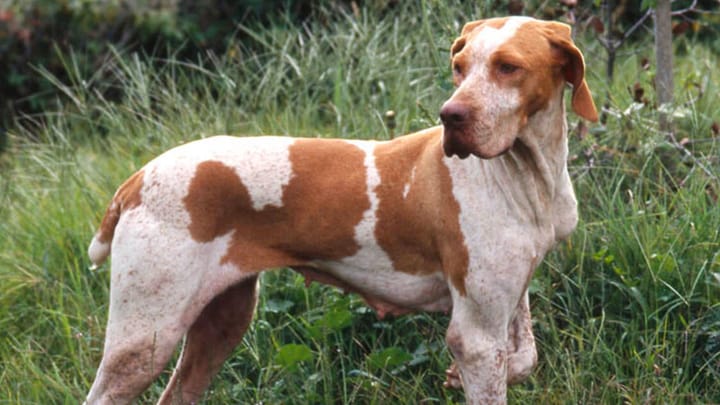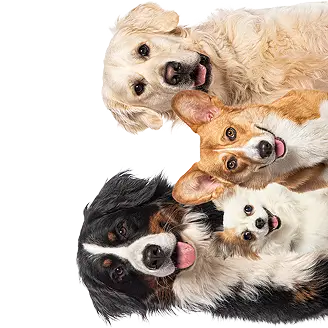Ariege Pointing Dog
Other names : Braque de l’Ariège, Braque du Midi

This French pointing gun dog is a relatively new breed to the working dog classification. A very energetic dog, mainly kept as a hunting dog, rather than a show or pet dog. Despite this, they do make good family pets, although sometimes remain quite aloof around humans. The Ariege Pointer breed was developed during the 19th and 20th century with totally French heritage.
|
Life expectancy |
The Ariege Pointing Dog has a life expectancy of between 11 and 13 years |
|
Temperament |
|
|
Size |
Medium
|
|
Adult size |
Female
Between 22 and 26 in
Male
Between 22 and 26 in
|
|
Adult weight |
Female
Between 55 and 66 lb
Male
Between 55 and 66 lb
|
|
Coat colour
Orange & White, Brown & White, Fawn & White, Fawn ticked, Brown ticked |
Red Sand |
|
Type of coat
The shiny coat of the Ariege Pointer is short and close-fitting. |
Short |
|
Eye colour
Dark amber to brown, depending on the colour of the coat. |
Brown
|
|
Purchase price |
The Ariege Pointing Dog costs between £500 and £700 |
Given that the Ariege Pointer is a relatively new breed, it is very rare. These Pointers display skills in hunting, retrieving and pointing, yet they still make very friendly and loving companions. At one period in time, the breed was almost extinct. However, although it is quite rare, the breed is no longer endangered. The Braque de l’Ariege as he is often known, is skilled when hunting quail, partridge, hare and many other types of wild game.
More details about the Ariege Pointing Dog
Ariege Pointing Dog: Origins and history
The Ariege breed first descended from old French Braques, yet over time these canines became very rare. The breed has been saved by a group of Ariegeois hunters, who continued to use these dogs for hunting purposes. It was further enlarged during 1990, when a team of breeders devoted themselves to breeding and producing more of them. In 2006, the Braque de l’Ariege was finally recognised by the UK Kennel Club.
Physical characteristics of the Ariege Pointing Dog
With a strong body and clean lines, the Ariege Pointer is built as a working dog, with great stamina. It has a rounded, straight skull and pendulous lips. The dog’s nose may be either flesh-coloured or brown. Long ears hang down from the dog’s face, facing inwards. The dog has long limbs that carry him for many miles when out hunting.
FCI classification of the Ariege Pointing Dog
-
Group 7 - Pointing Dogs
-
Section 1 : Continental Pointing Dogs
Ariege Pointing Dog: Characteristics
Ariege Pointing Dog: Behaviour
Ariege Pointing Dog: Lifestyle
Breed compatibility Ariege Pointing Dog
Ariege Pointing Dog: Purchase price
The initial purchase price to buy an Ariege Pointer puppy is between £500 to £700. The monthly cost to keep a dog of this breed will be between £80 to £100.
Ariege Pointing Dog: Grooming
As the Braque de l'Ariège has a short coat, grooming requirements are very minimal. The hair doesn’t get matted or tangled, and requires infrequent brushing.
Ariege Pointing Dog: Health
Generally recognised as a hearty and healthy dog breed. However, they are known to be prone to several health issues including patellar luxation glaucoma, bloat, chronic ear infection and epilepsy. Their average life expectancy is 11 to 13 years.
The Ariege Pointer is very energetic and robust. He is a skilled hunting and retrieving breed, with a brilliant sense of smell.
The short coat of the Braque de l'Ariège allows it to keep cool during periods of warmer weather.
As this dog is firstly a hunting dog, he is very hardy when hunting over many terrains, in all weathers. He will also retrieve game from land and even in cold water without any adverse effects.
Although he is a very active dog, once he retires from his working life and becomes a more sedentary dog, he will gain weight more easily.
- Ear infections
- Patellar luxation (Hip and elbow dysplasia)
- Glaucoma
- Epilepsy
- Bloat

